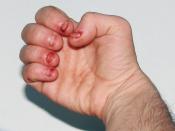Nobody deserves to suffer from OCD. With clomipramine and cognitive-behavior therapy OCD, symptoms will be forgotten. This disorder affects people regardless of race, gender, or age. A better understanding of the brain has lead researchers to the conclusion that chemical imbalance within the brain, in addition to environmental influences, causes this disorder. OCD, now recognizes as one of the most common psychiatric illnesses, with two to three percent of the population being effected (Karno et al., 1988; Jenike, 1989).
Typical obsessions include dirt, germs and contamination, fear of acting on violent or aggressive impulses, feeling overly responsible for the safety of others, abhorrent religious and sexual thoughts, and an inordinate concern with order (Obsessive). Furthermore, typical compulsions include repetitive behaviors such as excessive washing, cleaning, checking, touching, counting, arranging, ordering or hoarding (Obsessive). Disabling of the person with OCD ranges from mild to severe and sometimes hospitalization may be required.
However, many employees, including lawyers, doctors, engineers, and factory workers continue to work, despite symptoms of OCD. Furthermore, OCD affects the sufferer, his or her family and co-workers, even when a sufferer experiences few symptoms at some point during the day.
Therapists use two ways to treat OCD: drug therapy and CBT. Although, these drugs may get rid of the symptoms they do not cure the disease. Mainly, selective serotonin reuptake inhibitors (SSRIs) and serotonin reuptake inhibitors (SRIs), increase the levels of serotonin, which acts as a chemical messenger in the brain. The main SSRI's consist of fluoxetine, fluvoxamine, and sertraline. As well as, SRIs consist of clomipramine. Moreover, in CBT the therapist tries to prevent the patient from engaging in compulsive behavior and thoughts. In fact, no laboratory test can identify OCD, but a mental health professional who knows the disorder can conduct a specific type of...


